do you think 作插入语的用法
do you think 插入语
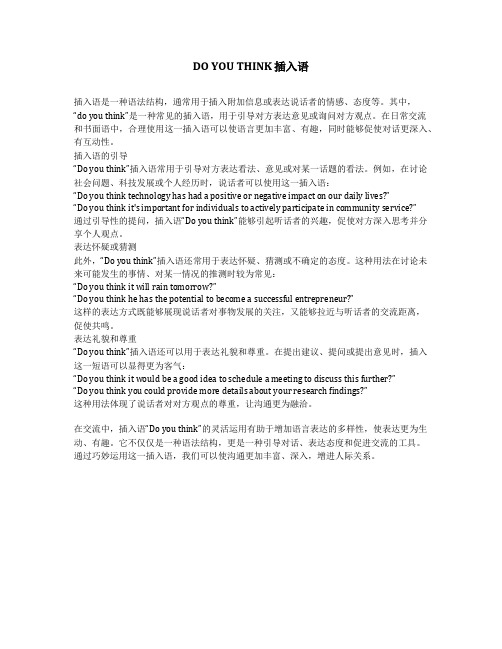
DO YOU THINK 插入语插入语是一种语法结构,通常用于插入附加信息或表达说话者的情感、态度等。
其中,“do you think”是一种常见的插入语,用于引导对方表达意见或询问对方观点。
在日常交流和书面语中,合理使用这一插入语可以使语言更加丰富、有趣,同时能够促使对话更深入、有互动性。
插入语的引导“Do you think”插入语常用于引导对方表达看法、意见或对某一话题的看法。
例如,在讨论社会问题、科技发展或个人经历时,说话者可以使用这一插入语:“Do you think technology has had a positive or negative impact on our daily lives?”“Do you think it's important for individuals to actively participate in community service?”通过引导性的提问,插入语“Do you think”能够引起听话者的兴趣,促使对方深入思考并分享个人观点。
表达怀疑或猜测此外,“Do you think”插入语还常用于表达怀疑、猜测或不确定的态度。
这种用法在讨论未来可能发生的事情、对某一情况的推测时较为常见:“Do you think it will rain tomorrow?”“Do you think he has the potential to become a successful entrepreneur?”这样的表达方式既能够展现说话者对事物发展的关注,又能够拉近与听话者的交流距离,促使共鸣。
表达礼貌和尊重“Do you think”插入语还可以用于表达礼貌和尊重。
在提出建议、提问或提出意见时,插入这一短语可以显得更为客气:“Do you think it would be a good idea to schedule a meeting to discuss this further?”“Do you think you could provide more details about your research findings?”这种用法体现了说话者对对方观点的尊重,让沟通更为融洽。
英语特殊句式解题技巧讲解及练习题(含答案)及解析
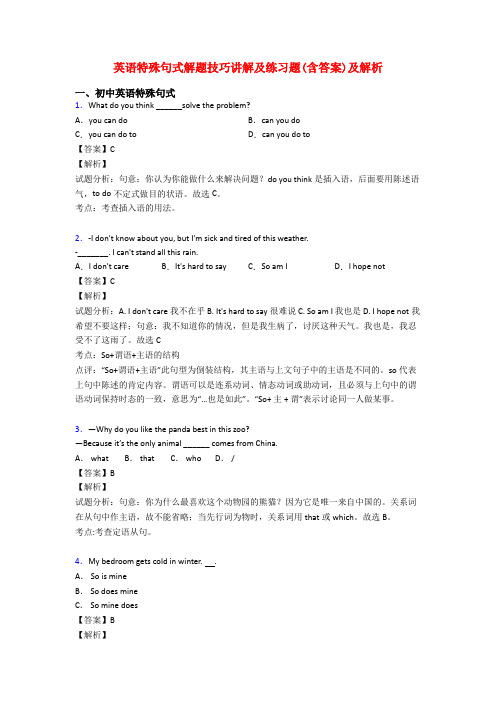
英语特殊句式解题技巧讲解及练习题(含答案)及解析一、初中英语特殊句式1.What do you think ______solve the problem?A.you can do B.can you doC.you can do to D.can you do to【答案】C【解析】试题分析:句意:你认为你能做什么来解决问题?do you think是插入语,后面要用陈述语气,to do不定式做目的状语。
故选C。
考点:考查插入语的用法。
2.-I don't know about you, but I'm sick and tired of this weather.-_______. I can't stand all this rain.A.I don't care B.It's hard to say C.So am I D.I hope not【答案】C【解析】试题分析:A. I don't care 我不在乎 B. It's hard to say很难说 C. So am I 我也是 D. I hope not我希望不要这样;句意:我不知道你的情况,但是我生病了,讨厌这种天气。
我也是,我忍受不了这雨了。
故选C考点:So+谓语+主语的结构点评:“So+谓语+主语”此句型为倒装结构,其主语与上文句子中的主语是不同的。
so代表上句中陈述的肯定内容。
谓语可以是连系动词、情态动词或助动词,且必须与上句中的谓语动词保持时态的一致,意思为“…也是如此”。
“So+ 主 + 谓”表示讨论同一人做某事。
3.—Why do you like the panda best in this zoo?—Because it’s the only animal ______ comes f rom China.A. what B. that C. who D. /【答案】B【解析】试题分析:句意:你为什么最喜欢这个动物园的熊猫?因为它是唯一来自中国的。
小升初英语插入语单选题20题

小升初英语插入语单选题20题1. Who is singing in the classroom? Do you think it's Tom?A. Do you think Tom is singing in the classroom?B. Do you think is Tom singing in the classroom?C. Do you think singing in the classroom is Tom?答案:A。
本题中“Do you think”是插入语,通常放在疑问词后,句子其他部分保持陈述语序。
B 选项语序错误,C 选项语序也不对。
只有 A 选项符合插入语的用法。
2. What will you do tomorrow? I think I will go to the park.A. I think go to the park I will tomorrow.B. I think I will go to the park tomorrow.C. I think tomorrow I will go to the park.答案:B。
“I think”是插入语,在句子中不影响句子的基本结构,通常放在主语“I”后,后面接句子的主干部分。
A 选项语序错误,C 选项语序也不符合英语表达习惯。
3. Where is your book? Do you think it's on the desk?A. Do you think on the desk is your book?B. Do you think your book is on the desk?C. Do you think is your book on the desk?答案:B。
“Do you think”作为插入语,应放在疑问词后,句子其他部分为陈述语序。
A 和C 选项语序错误。
4. Who will come to the party? I think it will be Lily.A. I think Lily will come to the party.B. I think will come to the party Lily.C. I think come to the party will be Lily.答案:A。
五年级插入语单选30题

五年级插入语单选30题1. Who, do you think, is the best student in our class?A. do you think whoB. you think whoC. who you thinkD. who think you答案:C。
本题考查插入语“do you think”的用法。
“do you think”在特殊疑问句中,一般放在疑问词之后,并且其后要用陈述句语序。
A 选项语序错误;B 选项缺少助动词;D 选项语序错误。
2. What, I believe, is your favorite color?A. I believe whatB. what I believeC. believe what ID. believe I what答案:B。
“I believe”作为插入语放在疑问词之后,其后用陈述句语序。
A 选项语序错误;C 和D 选项语序错误且表达不恰当。
3. When, do you suppose, will they come?A. do you suppose whenB. when you supposeC. suppose when youD. suppose you when答案:B。
“do you suppose”作为插入语放在疑问词之后,其后用陈述句语序。
A 选项语序错误;C 和D 选项语序错误且表达不恰当。
4. Where, in your opinion, is the park?A. in your opinion whereB. where in your opinionC. opinion where in yourD. opinion in your where答案:B。
“in your opinion”作为插入语放在疑问词之后,语序不变。
A 选项语序错误;C 和D 选项表达错误。
5. How, do you guess, did he solve the problem?A. do you guess howB. how you guessC. guess how youD. guess you how答案:B。
doyouthink作插入语的用法
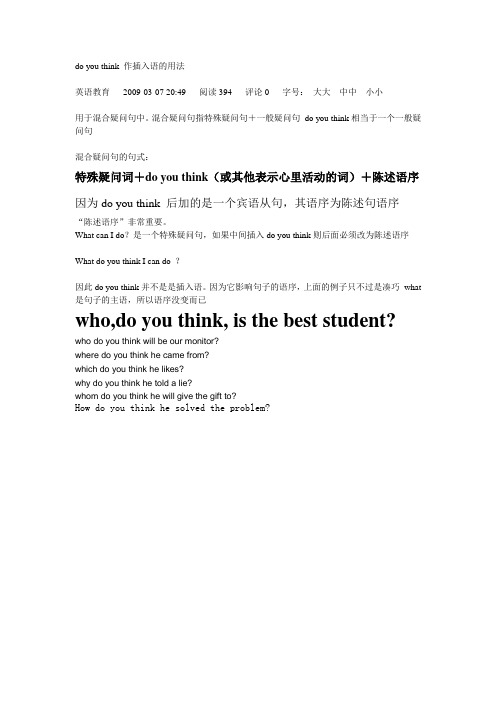
do you think 作插入语的用法
英语教育2009-03-07 20:49 阅读394 评论0 字号:大大中中小小
用于混合疑问句中。
混合疑问句指特殊疑问句+一般疑问句do you think相当于一个一般疑问句
混合疑问句的句式:
特殊疑问词+do you think(或其他表示心里活动的词)+陈述语序因为do you think 后加的是一个宾语从句,其语序为陈述句语序
“陈述语序”非常重要。
What can I do?是一个特殊疑问句,如果中间插入do you think则后面必须改为陈述语序
What do you think I can do ?
因此do you think并不是是插入语。
因为它影响句子的语序,上面的例子只不过是凑巧what 是句子的主语,所以语序没变而已
who,do you think, is the best student? who do you think will be our monitor?
where do you think he came from?
which do you think he likes?
why do you think he told a lie?
whom do you think he will give the gift to?
How do you think he solved the problem?。
do you think 作插入语的用法问题
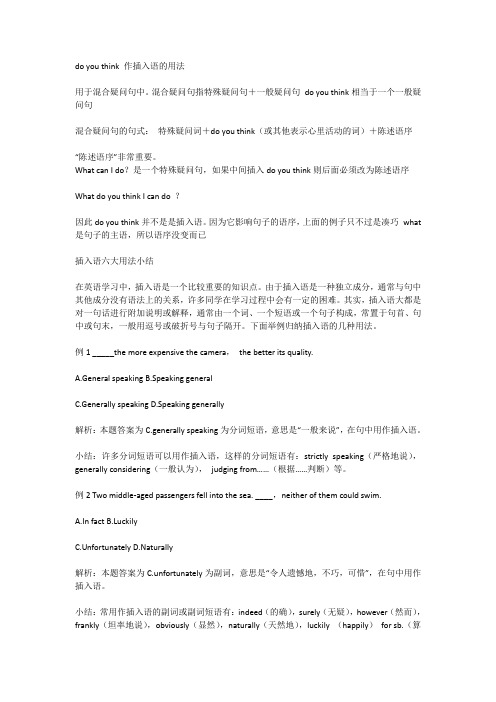
do you think 作插入语的用法用于混合疑问句中。
混合疑问句指特殊疑问句+一般疑问句do you think相当于一个一般疑问句混合疑问句的句式:特殊疑问词+do you think(或其他表示心里活动的词)+陈述语序“陈述语序”非常重要。
What can I do?是一个特殊疑问句,如果中间插入do you think则后面必须改为陈述语序What do you think I can do ?因此do you think并不是是插入语。
因为它影响句子的语序,上面的例子只不过是凑巧what 是句子的主语,所以语序没变而已插入语六大用法小结在英语学习中,插入语是一个比较重要的知识点。
由于插入语是一种独立成分,通常与句中其他成分没有语法上的关系,许多同学在学习过程中会有一定的困难。
其实,插入语大都是对一句话进行附加说明或解释,通常由一个词、一个短语或一个句子构成,常置于句首、句中或句末,一般用逗号或破折号与句子隔开。
下面举例归纳插入语的几种用法。
例1 _____the more expensive the camera,the better its quality.A.General speakingB.Speaking generalC.Generally speakingD.Speaking generally解析:本题答案为C.generally speaking为分词短语,意思是“一般来说”,在句中用作插入语。
小结:许多分词短语可以用作插入语,这样的分词短语有:strictly speaking(严格地说),generally considering(一般认为),judging from……(根据……判断)等。
例2 Two middle-aged passengers fell into the sea. ____,neither of them could swim.A.In factB.LuckilyC.UnfortunatelyD.Naturally解析:本题答案为C.unfortunately为副词,意思是“令人遗憾地,不巧,可惜”,在句中用作插入语。
【英语】英语特殊句式解题技巧及练习题
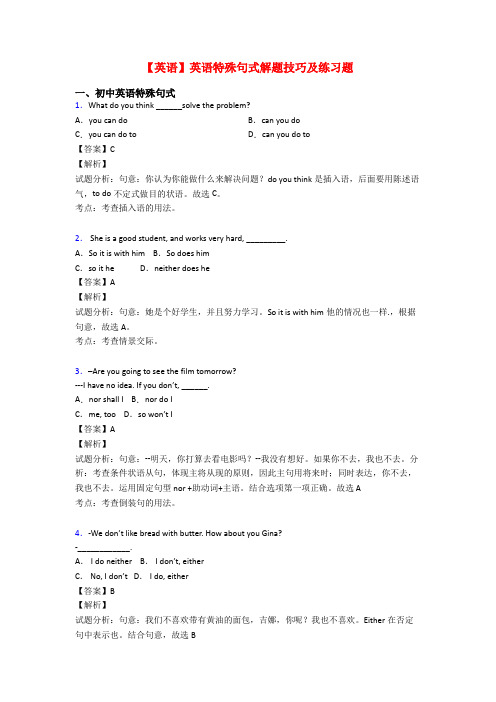
【英语】英语特殊句式解题技巧及练习题一、初中英语特殊句式1.What do you think ______solve the problem?A.you can do B.can you doC.you can do to D.can you do to【答案】C【解析】试题分析:句意:你认为你能做什么来解决问题?do you think是插入语,后面要用陈述语气,to do不定式做目的状语。
故选C。
考点:考查插入语的用法。
2. She is a good student, and works very hard, _________.A.So it is with him B.So does himC.so it he D.neither does he【答案】A【解析】试题分析:句意:她是个好学生,并且努力学习。
So it is with him他的情况也一样.,根据句意,故选A。
考点:考查情景交际。
3.–Are you going to see the film tomorrow?---I have no idea. If you don’t, ______.A.nor shall I B.nor do IC.me, too D.so won’t I【答案】A【解析】试题分析:句意:--明天,你打算去看电影吗?--我没有想好。
如果你不去,我也不去。
分析:考查条件状语从句,体现主将从现的原则,因此主句用将来时;同时表达,你不去,我也不去。
运用固定句型nor +助动词+主语。
结合选项第一项正确。
故选 A考点:考查倒装句的用法。
4.-We don’t like bread with butter. How abo ut you Gina?-____________.A. I do neither B.I don’t, eitherC.No, I don’t D. I do, either【答案】B【解析】试题分析:句意:我们不喜欢带有黄油的面包,吉娜,你呢?我也不喜欢。
Do you think作插入语的用法

Do you think(一)作插入语的用法付林【】:正 Do you think(你认为……)常用作插入语,很多同学对它的用法不是很了解,下面我们就谈一谈Do you think作插入语的几种情况:do you think 作插入语的用法用于混合疑问句中。
混合疑问句指特殊疑问句+一般疑问句 do you think相当于一个一般疑问句混合疑问句的句式:特殊疑问词+do you think(或其他表示心里活动的词)+陈述语序“陈述语序”非常重要。
What can I do?是一个特殊疑问句,如果中间插入do you think则后面必须改为陈述语序What do you think I can do ?因此do you think并不是是插入语。
因为它影响句子的语序,上面的例子只不过是凑巧 what是句子的插入语是做插入成分,补充说明限定作用,去掉不影响原句结构what do you think I should tell Tom?这里去掉do you think影响原句结构,是怎么回事?请多举2个例子不要绝对地去理解这里的不影响结构。
因为这里插入语本身就是一疑问语序了,所以不再用疑问语序了。
如果去掉了,当然要改语序。
What food do you think is healthy and which is unhealthy?该句为“特殊疑问词+do you think+其他部分构成的,用以征询对方的看法或推测等。
其中的do you think 是插入语,并不影响全句结构。
可以用于这一结构的动词还有believe,imagine,suppose等,如:Who do you think has got the first prize?你认为谁获得了第一名? Which do you suppose will be taken away next?你认为接下来被拿走的是哪一个?但是当think,believe,imagine,suppose 等用在“think+宾语+to be”结构时,要慎重选择who(主格)或whom (宾格),试比较: 1)Whom do you think to be the best in our class?你认为谁是我们班最好的学生? 2)Who do you think will be our English teacher next term?你认为下学期谁会当我们英语教师?句1为“think sb. to be”结构,是对sb.表示疑问。
难点 插入语
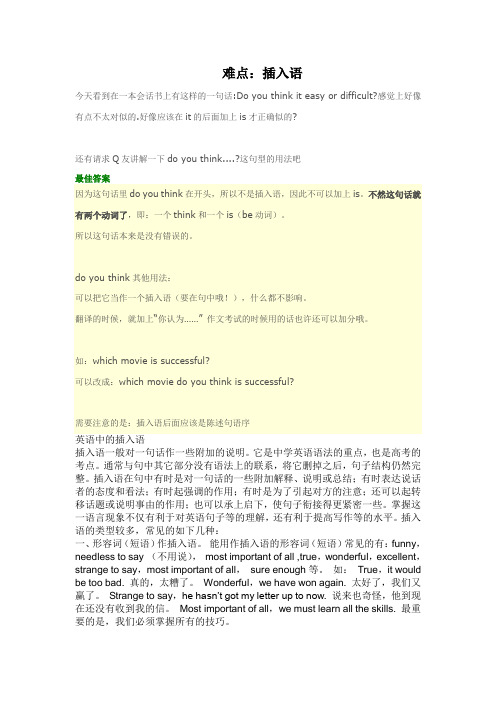
难点:插入语今天看到在一本会话书上有这样的一句话:Do you think it easy or difficult?感觉上好像有点不太对似的.好像应该在it的后面加上is才正确似的?还有请求Q友讲解一下do you think....?这句型的用法吧最佳答案因为这句话里do you think在开头,所以不是插入语,因此不可以加上is。
不然这句话就有两个动词了,即:一个think和一个is(be动词)。
所以这句话本来是没有错误的。
do you think其他用法:可以把它当作一个插入语(要在句中哦!),什么都不影响。
翻译的时候,就加上“你认为……” 作文考试的时候用的话也许还可以加分哦。
如:which movie is successful?可以改成:which movie do you think is successful?需要注意的是:插入语后面应该是陈述句语序英语中的插入语插入语一般对一句话作一些附加的说明。
它是中学英语语法的重点,也是高考的考点。
通常与句中其它部分没有语法上的联系,将它删掉之后,句子结构仍然完整。
插入语在句中有时是对一句话的一些附加解释、说明或总结;有时表达说话者的态度和看法;有时起强调的作用;有时是为了引起对方的注意;还可以起转移话题或说明事由的作用;也可以承上启下,使句子衔接得更紧密一些。
掌握这一语言现象不仅有利于对英语句子等的理解,还有利于提高写作等的水平。
插入语的类型较多,常见的如下几种:一、形容词(短语)作插入语。
能用作插入语的形容词(短语)常见的有:funny,needless to say (不用说),most important of all ,true,wonderful,excellent,strange to say,most important of all,sure enough等。
如:True,it would be too bad. 真的,太糟了。
do you think 用法

do you think 用法
"do you think"是一个常用的英语短语,通常用于引出一个问题或者请求对方的意见。
这个短语常常用在对话中,用来询问对方的看法或意见。
比如,你可以说,"Do you think it's a good idea to go on a trip this weekend?"(你觉得这个周末出去旅行是个好主意吗?)在这个例子中,“do you think”用来询问对方的意见。
除了用于引出问题,"do you think"也可以用来表达自己的怀疑或者猜测。
比如,"I don't know if I can trust him. Do you think he's telling the truth?"(我不知道我是否能相信他。
你觉得他在说真话吗?)在这个例子中,“do you think”用来表达对某件事情的怀疑,并请求对方的意见。
另外,"do you think"也可以用于表达对某种可能性的探讨。
比如,"Do you think it will rain tomorrow?"(你觉得明天会下雨吗?)在这个例子中,“do you think”用来询问对方对未来可能发生的事情的看法。
总之,“do you think”是一个非常常用的短语,用于引出问
题、表达怀疑或猜测,以及询问对方的意见或看法。
希望这个回答能够帮助你理解这个短语的用法。
六年级英语插入语理解单选题20题(含答案)
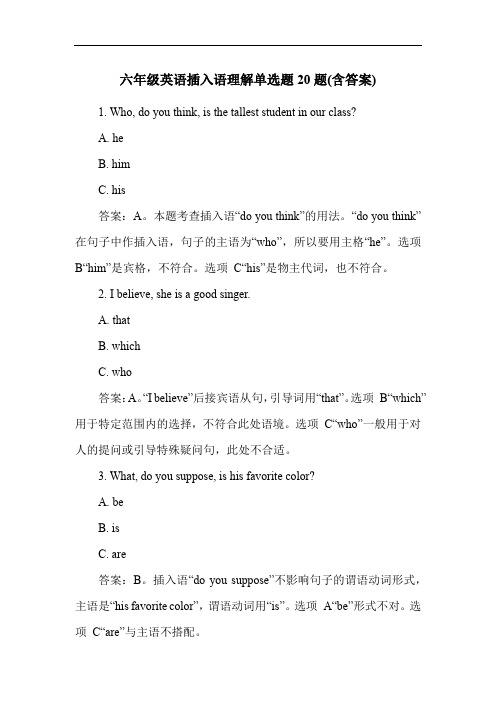
六年级英语插入语理解单选题20题(含答案)1. Who, do you think, is the tallest student in our class?A. heB. himC. his答案:A。
本题考查插入语“do you think”的用法。
“do you think”在句子中作插入语,句子的主语为“who”,所以要用主格“he”。
选项B“him”是宾格,不符合。
选项C“his”是物主代词,也不符合。
2. I believe, she is a good singer.A. thatB. whichC. who答案:A。
“I believe”后接宾语从句,引导词用“that”。
选项B“which”用于特定范围内的选择,不符合此处语境。
选项C“who”一般用于对人的提问或引导特殊疑问句,此处不合适。
3. What, do you suppose, is his favorite color?A. beB. isC. are答案:B。
插入语“do you suppose”不影响句子的谓语动词形式,主语是“his favorite color”,谓语动词用“is”。
选项A“be”形式不对。
选项C“are”与主语不搭配。
4. They think, perhaps, it will rain tomorrow.A. maybeB. may beC. must be答案:A。
“perhaps”和“maybe”意思相近,可以互换。
选项B“may be”表示“可能是”,与题意不符。
选项C“must be”表示“一定是”,语气太肯定。
5. In my opinion, he is very kind.A. I thinkB. I guessC. I say答案:A。
“in my opinion”和“I think”都表示“我认为”。
选项B“I guess”是“我猜测”,语气不太一样。
选项C“I say”不太常用,且意思与题目不符。
如何判断doyouthink是否是插入语
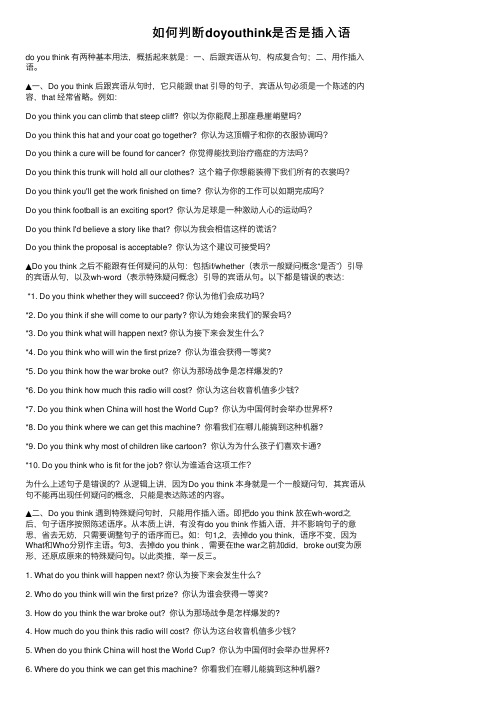
如何判断doyouthink是否是插⼊语do you think 有两种基本⽤法,概括起来就是:⼀、后跟宾语从句,构成复合句;⼆、⽤作插⼊语。
▲⼀、Do you think 后跟宾语从句时,它只能跟 that 引导的句⼦,宾语从句必须是⼀个陈述的内容,that 经常省略。
例如:Do you think you can climb that steep cliff? 你以为你能爬上那座悬崖峭壁吗?Do you think this hat and your coat go together? 你认为这顶帽⼦和你的⾐服协调吗?Do you think a cure will be found for cancer? 你觉得能找到治疗癌症的⽅法吗?Do you think this trunk will hold all our clothes? 这个箱⼦你想能装得下我们所有的⾐裳吗?Do you think you'll get the work finished on time? 你认为你的⼯作可以如期完成吗?Do you think football is an exciting sport? 你认为⾜球是⼀种激动⼈⼼的运动吗?Do you think I'd believe a story like that? 你以为我会相信这样的谎话?Do you think the proposal is acceptable? 你认为这个建议可接受吗?▲Do you think 之后不能跟有任何疑问的从句:包括if/whether(表⽰⼀般疑问概念“是否”)引导的宾语从句,以及wh-word(表⽰特殊疑问概念)引导的宾语从句。
以下都是错误的表达:*1. Do you think whether they will succeed? 你认为他们会成功吗?*2. Do you think if she will come to our party? 你认为她会来我们的聚会吗?*3. Do you think what will happen next? 你认为接下来会发⽣什么?*4. Do you think who will win the first prize? 你认为谁会获得⼀等奖?*5. Do you think how the war broke out? 你认为那场战争是怎样爆发的?*6. Do you think how much this radio will cost? 你认为这台收⾳机值多少钱?*7. Do you think when China will host the World Cup? 你认为中国何时会举办世界杯?*8. Do you think where we can get this machine? 你看我们在哪⼉能搞到这种机器?*9. Do you think why most of children like cartoon? 你认为为什么孩⼦们喜欢卡通?*10. Do you think who is fit for the job? 你认为谁适合这项⼯作?为什么上述句⼦是错误的?从逻辑上讲,因为Do you think 本⾝就是⼀个⼀般疑问句,其宾语从句不能再出现任何疑问的概念,只能是表达陈述的内容。
高中英语疑难探究 Do you think的误用及修正素材
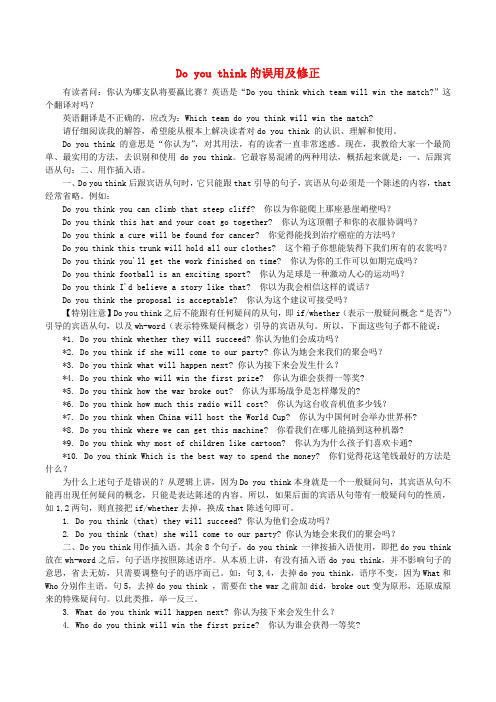
Do you think的误用及修正有读者问:你认为哪支队将要赢比赛?英语是“Do you think which team will win the match?”这个翻译对吗?英语翻译是不正确的,应改为:Which team do you think will win the match?请仔细阅读我的解答,希望能从根本上解决读者对do you think 的认识、理解和使用。
Do you think 的意思是“你认为”,对其用法,有的读者一直非常迷惑。
现在,我教给大家一个最简单、最实用的方法,去识别和使用do you think。
它最容易混淆的两种用法,概括起来就是:一、后跟宾语从句;二、用作插入语。
一、Do you think后跟宾语从句时,它只能跟that引导的句子,宾语从句必须是一个陈述的内容,that 经常省略。
例如:Do you think you can climb that steep cliff? 你以为你能爬上那座悬崖峭壁吗?Do you think this hat and your coat go together? 你认为这顶帽子和你的衣服协调吗?Do you think a cure will be found for cancer? 你觉得能找到治疗癌症的方法吗?Do you think this trunk will hold all our clothes? 这个箱子你想能装得下我们所有的衣裳吗?Do you think you'll get the work finished on time? 你认为你的工作可以如期完成吗?Do you think football is an exciting sport? 你认为足球是一种激动人心的运动吗?Do you think I'd believe a story like that? 你以为我会相信这样的谎话?Do you think the proposal is acceptable? 你认为这个建议可接受吗?【特别注意】Do you think之后不能跟有任何疑问的从句,即if/whether(表示一般疑问概念“是否”)引导的宾语从句,以及wh-word(表示特殊疑问概念)引导的宾语从句。
【英语】英语特殊句式的基本方法技巧及练习题及练习题(含答案)

【英语】英语特殊句式的基本方法技巧及练习题及练习题(含答案)一、初中英语特殊句式1.What do you think ______solve the problem?A.you can do B.can you doC.you can do to D.can you do to【答案】C【解析】试题分析:句意:你认为你能做什么来解决问题?do you think是插入语,后面要用陈述语气,to do不定式做目的状语。
故选C。
考点:考查插入语的用法。
2.-I don't know about you, but I'm sick and tired of this weather.-_______. I can't stand all this rain.A.I don't care B.It's hard to say C.So am I D.I hope not【答案】C【解析】试题分析:A. I don't care 我不在乎 B. It's hard to say很难说 C. So am I 我也是 D. I hope not我希望不要这样;句意:我不知道你的情况,但是我生病了,讨厌这种天气。
我也是,我忍受不了这雨了。
故选C考点:So+谓语+主语的结构点评:“So+谓语+主语”此句型为倒装结构,其主语与上文句子中的主语是不同的。
so代表上句中陈述的肯定内容。
谓语可以是连系动词、情态动词或助动词,且必须与上句中的谓语动词保持时态的一致,意思为“…也是如此”。
“So+ 主 + 谓”表示讨论同一人做某事。
3. --- Would your younger brother go for a picnic this Sunday ?--- If I don’t go , ___________.A.so does he B.so he willC.neither will he D.neither does he【答案】C【解析】试题分析:句意:—你的弟弟这星期天会去野餐吗?—如果我不去,他也不会去。
Do you think作插入语的用法

Do you think作插入语的用法
付林
【期刊名称】《英语辅导:初二年级》
【年(卷),期】2003(000)012
【摘要】Do you think(你认为……)常用作插入语,很多同学对它的用法不是很了解,下面我们就谈一谈Do you think作插入语的几种情况:
【总页数】1页(P8)
【作者】付林
【作者单位】无
【正文语种】中文
【中图分类】G633.41
【相关文献】
1.英语插入语的几种常见用法 [J], 孟爱波
2.英语插入语标点的用法探究 [J], 余明朝;
3.不定式短语作插入语荟萃 [J], 张璞;
4.作宾补和插入语的what从句 [J], 王爱莲;张春生;
5.插入语的类型及其用法 [J], 王道发;
因版权原因,仅展示原文概要,查看原文内容请购买。
what do you think 句型和 do you think 句型
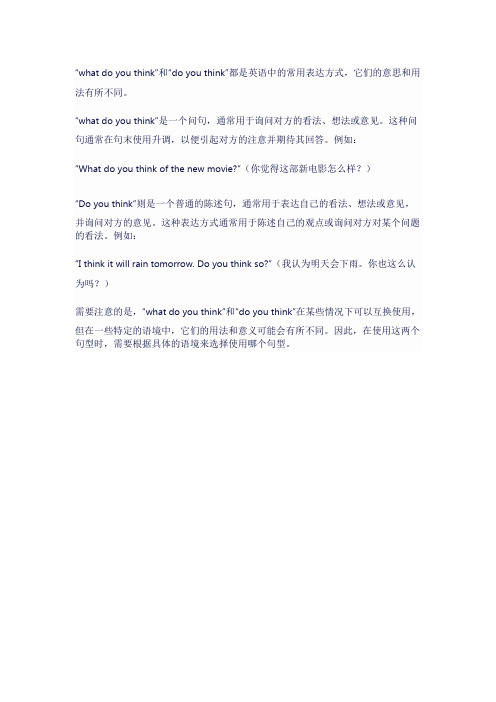
“what do you think”和“do you think”都是英语中的常用表达方式,它们的意思和用
法有所不同。
“what do you think”是一个问句,通常用于询问对方的看法、想法或意见。
这种问句通常在句末使用升调,以便引起对方的注意并期待其回答。
例如:
“What do you think of the new movie?”(你觉得这部新电影怎么样?)
“Do you think”则是一个普通的陈述句,通常用于表达自己的看法、想法或意见,
并询问对方的意见。
这种表达方式通常用于陈述自己的观点或询问对方对某个问题的看法。
例如:
“I think it will rain tomorrow. Do you think so?”(我认为明天会下雨。
你也这么认
为吗?)
需要注意的是,“what do you think”和“do you think”在某些情况下可以互换使用,
但在一些特定的语境中,它们的用法和意义可能会有所不同。
因此,在使用这两个句型时,需要根据具体的语境来选择使用哪个句型。
- 1、下载文档前请自行甄别文档内容的完整性,平台不提供额外的编辑、内容补充、找答案等附加服务。
- 2、"仅部分预览"的文档,不可在线预览部分如存在完整性等问题,可反馈申请退款(可完整预览的文档不适用该条件!)。
- 3、如文档侵犯您的权益,请联系客服反馈,我们会尽快为您处理(人工客服工作时间:9:00-18:30)。
do you think 作插入语的用法
用于混合疑问句中。
混合疑问句指特殊疑问句+一般疑问句 do you think相当于一个一般疑问句
混合疑问句的句式:特殊疑问词+do you think(或其他表示心里活动的词)+陈述语序
“陈述语序”非常重要。
What can I do?是一个特殊疑问句,如果中间插入do you think则后面必须改为陈述语序What do you think I can do ?
因此do you think并不是是插入语。
因为它影响句子的语序,上面的例子只不过是凑巧 what 是句子的主语,所以语序没变而已
插入语六大用法小结
在英语学习中,插入语是一个比较重要的知识点。
由于插入语是一种独立成分,通常与句中其他成分没有语法上的关系,许多同学在学习过程中会有一定的困难。
其实,插入语大都是对一句话进行附加说明或解释,通常由一个词、一个短语或一个句子构成,常置于句首、句中或句末,一般用逗号或破折号与句子隔开。
下面举例归纳插入语的几种用法。
例1 _____the more expensive the camera, the better its quality.
A.General speaking
B.Speaking general
C.Generally speaking
D.Speaking generally
解析:本题答案为C.generally speaking为分词短语,意思是“一般来说”,在句中用作插入语。
小结:许多分词短语可以用作插入语,这样的分词短语有:strictly speaking(严格地说),generally considering(一般认为), judging from……(根据……判断)等。
例2 Two middle-aged passengers fell into the sea. ____,neither of them could swim.
A.In fact
B.Luckily
C.Unfortunately
D.Naturally
解析:本题答案为C.unfortunately为副词,意思是“令人遗憾地,不巧,可惜”,在句中用作插入语。
小结:常用作插入语的副词或副词短语有:indeed(的确),surely(无疑),however(然
而),frankly(坦率地说),obviously(显然),naturally(天然地),luckily (happily)for sb.(算某人幸运),fortunately(幸好),strangely(奇怪),briefly(简单地说)等。
例3 Your performance in the driving test didn’t reach the required standard,_____,you failed.
A.in the end
B.after all
C.in other words
D.at the same time
解析:本题答案为C.in other words为介词短语,意思是“换句话说”,在句中用作插入语。
小结:常用作插入语的介词短语有:in conclusion(总之),in a word(简而言之),in short (简而言之),in general(一般说来),in a sense(在某种意义上),in my view(在我看来),in his opinion(按照他的看法),in fact(事实上),at first(首先), in addition (此外),of course(当然),to my surprise(使我惊奇的),to her regret(使她遗憾的),for example(例如)等。
例4 It is so nice to hear from her._____,we last met more than thirty years ago.
A.What‘s more
B.That is to say
C.In other words
D.Believe it or not
解析:本题答案为D.believe it or not为一分句,意思是“信不信由你”,在句中作插入语。
小结:用简短的句子结构作插入语,它们常置于句中或句末。
这类简短的句子有:I am sure (我可以肯定地说),I believe(我相信),do you know(你知道吗),you see(你明白),I’m afraid(恐怕),it is said(据说),I suppose(我想),what’s more(而且),what’s worse(更糟糕的是),that is(也就是说),what is important(重要的是)等。
例5 _____ with you,I have no money to spare.
A.To be frank
B.What’s more
C.In addition
D.However
解析:本题答案为A.to be frank为不定式短语,意思是“坦率地说”,在句中用作插入语。
小结:常用作插入语的不定式短语有:to be sure(无疑地),to sum up(概括地说),to tell the truth(老实说)等。
例6 _____, he should have done such a thing.
A.Speaking general
B.Strange to say
C.Luckily
D.Of course
解析:本题答案为B.strange to say为形容词短语,意思是“说也奇怪”,在句中用作插入语。
小结:常用作插入语的形容词或其短语有:true(真的),funny(真可笑),needless to say (不用说),most important of all(最为重要),worse still(更糟糕的),even better (更好)等。
